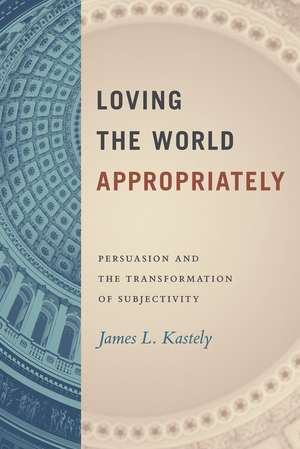Loving the World Appropriately: Persuasion and the Transformation of Subjectivity
Autor James L. Kastelyen Limba Engleză Hardback – 8 dec 2022
What is persuasion? For some, it is the ideal alternative to violence. For others, persuasion is simply a neutral instrumentality—a valued source of soft power. Both positions rest on a fundamental belief: persuasion is a power that resides in a speaker acting on an audience. Loving the World Appropriately asks a different, more fundamental, question: why does an audience need persuasion? In shifting our focus, James Kastely delivers a provocative new history of rhetoric and philosophy, one that describes rhetoric as more than a matter of effective communication and recasts persuasion as a philosophical concern central to notions of human subjectivity. Ultimately, Kastely insists, persuasion enables us to love the world appropriately.
Preț: 301.73 lei
Nou
Puncte Express: 453
Preț estimativ în valută:
57.74€ • 59.94$ • 48.15£
57.74€ • 59.94$ • 48.15£
Carte disponibilă
Livrare economică 04-18 martie
Livrare express 15-21 februarie pentru 36.37 lei
Preluare comenzi: 021 569.72.76
Specificații
ISBN-13: 9780226822105
ISBN-10: 0226822109
Pagini: 264
Dimensiuni: 152 x 229 x 25 mm
Greutate: 0.48 kg
Ediția:First Edition
Editura: University of Chicago Press
Colecția University of Chicago Press
ISBN-10: 0226822109
Pagini: 264
Dimensiuni: 152 x 229 x 25 mm
Greutate: 0.48 kg
Ediția:First Edition
Editura: University of Chicago Press
Colecția University of Chicago Press
Notă biografică
James L. Kastely is professor of English at the University of Houston. He is the author of Rethinking the Rhetorical Tradition: From Plato to Postmodernism and The Rhetoric of Plato’s Republic: Democracy and the Philosophical Problem of Persuasion.
Cuprins
Preface
Chapter 1: The Problem of Persuasion
Chapter 2: Persuasion, Liberal Alienation, and Hegemony
Chapter 3: The Eros of Sameness and the Rhetoric of Difference in Plato’s Phaedrus
Chapter 4: Responsiveness: Toward a Theory of Rhetorical Subjectivity
Chapter 5: Persuasion, Conceptualization, and Emotion: Reconstituting Subjectivity
Chapter 6: The Individual and Political Persuasion
Chapter 7: Persuasion, Tragedy, and Transformative Discourse
Chapter 8: The Ethics of Persuasion
Chapter 9: Conclusion: Persuasion in Light of Post-Structural Rhetoric
Acknowledgments
Works Cited
Index
Chapter 1: The Problem of Persuasion
Chapter 2: Persuasion, Liberal Alienation, and Hegemony
Chapter 3: The Eros of Sameness and the Rhetoric of Difference in Plato’s Phaedrus
Chapter 4: Responsiveness: Toward a Theory of Rhetorical Subjectivity
Chapter 5: Persuasion, Conceptualization, and Emotion: Reconstituting Subjectivity
Chapter 6: The Individual and Political Persuasion
Chapter 7: Persuasion, Tragedy, and Transformative Discourse
Chapter 8: The Ethics of Persuasion
Chapter 9: Conclusion: Persuasion in Light of Post-Structural Rhetoric
Acknowledgments
Works Cited
Index
Recenzii
"[Kastley's] excellent synthesis of the philosophies of such theorists as Leo Bersani, Anne Carson, and Sigmund Freud makes for an intellectually potent investigation of persuasion . . . . This rewards careful study."
“In this timely, impressive text, Kastely provides a rigorous reconsideration of the definitions and meanings of persuasion and constructs a clear case for redefinition. . . . Relocated from rhetoricians to subjects, persuasion is redefined to mean an action and event in which subjectivity is transformed. In its efforts, persuasion justifies the practice of rhetoric and exists as a value that, Kastely writes, is a ‘core value for democracy.’ Persuasion, a value in itself, guides individuals’ growth in ‘loving the world appropriately.’”
“Loving the World Appropriately presents a robust rhetorical theory of mind on its way to an entirely new formulation of persuasion. And Kastely is just the scholar to present such a theory. The resulting account is by turns riveting, delightful, and weighty.”
“In the battle between the ancients and the moderns in rhetoric, Kastely provides generous readings of a variety of texts that will serve as a resource for all students of rhetoric, regardless of their aims. An original work that is a pleasure to read.”
“In Loving the World Appropriately, Kastely reimagines the rhetorical tradition through the multifaceted lens of postmodern critique, refashioning ancient ideas shared by the likes of Euripides, Plato, and Aristotle. He does these thinkers no violence, however, locating within their thought a meaningful response to pressing concerns about the force of persuasion. Like the reconstitution he proposes, Kastely never imposes his reading; rather, he invites the reader to reconsider the constitution of rhetoric with sincerity, humility, and appropriately, love.”
